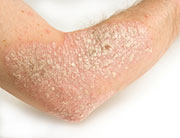- 10 Strategies to Overcome Insomnia
- Could Artificial Sweeteners Be Aging the Brain Faster?
- Techniques for Soothing Your Nervous System
- Does the Water in Your House Smell Funny? Here’s Why
- Can a Daily Dose of Apple Cider Vinegar Actually Aid Weight Loss?
- 6 Health Beverages That Can Actually Spike Your Blood Sugar
- Treatment Options for Social Anxiety Disorder
- Understanding the Connection Between Anxiety and Depression
- How Daily Prunes Can Influence Cholesterol and Inflammation
- When to Take B12 for Better Absorption and Energy
Worse Psoriasis, Less Healthy Arteries, Study Finds


The skin disorder psoriasis appears linked with artery inflammation, raising the odds for heart disease, a new study says.
“As the amount of psoriasis increases, the amount of blood vessel inflammation increases,” said senior investigator Dr. Nehal Mehta, a clinical investigator with the U.S. National Heart, Lung, and Blood Institute.
His team also found that even mild psoriasis may indicate an increased risk for heart attack and stroke.
Just one psoriasis skin patch, or plaque, “might be biologically active, causing low-grade inflammation and starting a cascade, speeding up their blood vessel disease,” Mehta said.
“People really should know that psoriasis is not just a cosmetic disease,” he added.
However, these study findings only show an association between psoriasis and blood vessel inflammation, not a direct cause-and-effect relationship, Mehta said. His team is now conducting a study to see if treating psoriasis lowers blood vessel inflammation.
Psoriasis is a chronic disease that affects about 3 percent of U.S. adults. It occurs when skin cells grow too quickly, causing thick, white or red patches of skin.
Blood vessel, or vascular, inflammation is most likely the direct result of psoriasis, not treatment, Mehta said.
Treating psoriasis may lower the risk for heart attack and stroke, he said.
Previous research has found that psoriasis may be linked with a greater risk of heart attack and stroke and heart disease-related death. This new study may be the first to examine if psoriasis severity affects inflammation in the blood vessels, Mehta said.
Inflammation can cause blood vessels, including arteries, to narrow, which limits blood flow, according to the National Heart, Lung, and Blood Institute.
Mehta advises people with psoriasis to lower their risk of heart disease by controlling traditional risk factors.
“Avoid smoking, try to maintain a healthy lifestyle, including moderate exercise and a balanced diet,” he said. “You should also have your blood pressure, cholesterol and blood sugar checked. Try to do that, because psoriasis itself might be a risk factor.”
For the study, published online Oct. 8 in the journal Arteriosclerosis, Thrombosis and Vascular Biology, researchers compared 60 adults with psoriasis to 20 people without the condition. All participants were in their 40s on average and at low risk for heart disease.
Some had mild psoriasis — a few patches on less than 3 percent of their skin. Severe cases involved patches covering more than 10 percent of the skin.
Despite severity, PET scans revealed that all participants with psoriasis had increased levels of inflammation in their blood vessels, the researchers said.
The worst psoriasis was associated with a 41 percent increase in blood vessel inflammation, compared with participants without psoriasis. The relationship between psoriasis and increased blood vessel inflammation didn’t change much after accounting for other heart disease risk factors, such as blood pressure, cholesterol, blood sugar, weight and smoking, the study authors said.
Michael Siegel, director of research programs at the National Psoriasis Foundation, said patients should take psoriasis seriously and treat it appropriately.
“Even mild psoriasis carries a risk for heart problems,” he said. Although it is not yet proven that treating psoriasis reduces the risk of heart attack and stroke, there is enough evidence to suggest that patients should have their disease treated, Siegel said.
“There are systemic consequences to psoriasis and people with severe disease need to seek the most effective treatment possible,” he said.
More information
For more on psoriasis, visit the National Psoriasis Foundation.
Source: HealthDay
Copyright © 2026 HealthDay. All rights reserved.










